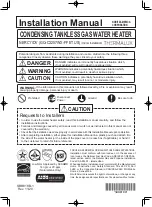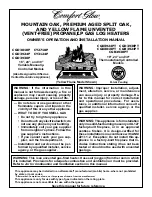
www.desatech.com
124452-01A
5
Install and use heater with care. Follow all
local codes. In the absence of local codes,
use the latest edition of
The National Fuel
Gas Code ANSI Z223/NFPA 54*.
*Available from:
American National Standards Institute, Inc.
1430 Broadway
New York, NY 10018
National Fire Protection Association, Inc.
Batterymarch Park
Quincy, MA 02269
Note: Where listed vented decorative logs are
required, thermostat models are not permitted.
PRODUCT FEATURES
AIR FOR COMbUSTION AND VENTILATION
UNPACkING
LOCAL CODES
CAUTION: Do not remove the
data plates from the grate as
-
sembly. The data plates contain
important warranty and safety
information.
1. Remove log and heater base assembly
from carton.
Note: Do not pick up heater base assem-
bly by burners. This could damage heater.
Always handle base assembly by grate
.
2. Remove all protective packaging applied
to log and heater for shipment.
3. Check heater for any shipping damage. If
heater is damaged call DESA Heating, LLC
at 1-866-672-6040 for replacement parts
before returning to dealer.
OPERATION
This heater is clean burning. It requires no
outside venting. There is no heat loss out a
vent or up a chimney. Heat is generated by
realistic, dancing yellow flames. This heater
is designed for vent-free operation with flue
damper closed. It has been tested and
approved to ANSI Z21.11.2 standard for
unvented heaters. State and local codes
in some areas prohibit the use of vent-free
heaters. Non-thermostat models may also
be operated as a vented decorative (ANSI
Z21.60) product by opening flue damper.
SAFETY PILOT
This heater has a pilot with an Oxygen Deple-
tion Sensing (ODS) safety shutoff system. The
ODS/pilot is a required feature for vent-free
room heaters. The ODS/pilot shuts off the
heater if there is not enough fresh air.
WARNING: This heater shall
not be installed in a room or space
unless the required volume of in
-
door combustion air is provided
by the method described in the
National Fuel Gas Code, ANSI
Z223.1/NFPA 54,
the
International
Fuel Gas Code,
or applicable lo
-
cal codes. Read the following in
-
structions to insure proper fresh
air for this and other fuel-burning
appliances in your home.
Today’s homes are built more energy efficient
than ever. New materials, increased insulation
and new construction methods help reduce
heat loss in homes. Home owners weather
strip and caulk around windows and doors to
keep the cold air out and the warm air in. Dur-
ing heating months, home owners want their
homes as airtight as possible.
While it is good to make your home energy
efficient, your home needs to breathe. Fresh
air must enter your home. All fuel-burning ap-
pliances need fresh air for proper combustion
and ventilation.
State of Massachusetts:
The installa-
tion must be made by a licensed plumber
or gas fitter in the Commonwealth of
Massachusetts.
Sellers of unvented propane or natural
gas-fired supplemental room heaters shall
provide to each purchaser a copy of 527
CMR 30 upon sale of the unit.
Vent-free gas products are prohibited for
bedroom and bathroom installation in the
Commonwealth of Massachusetts.






































